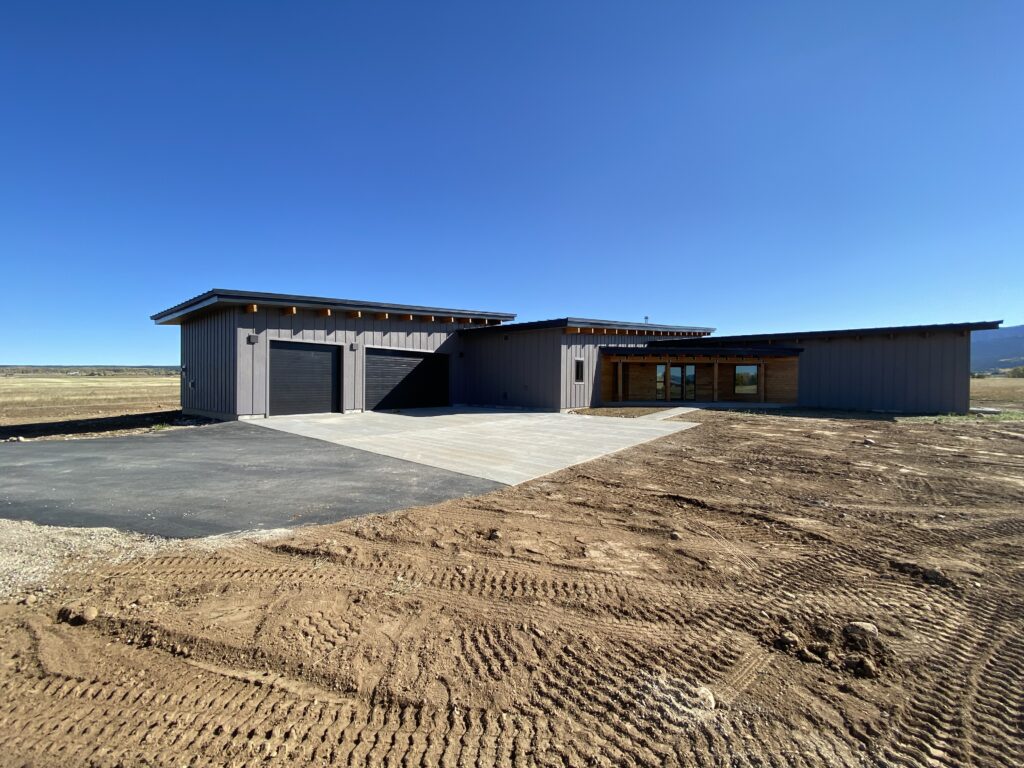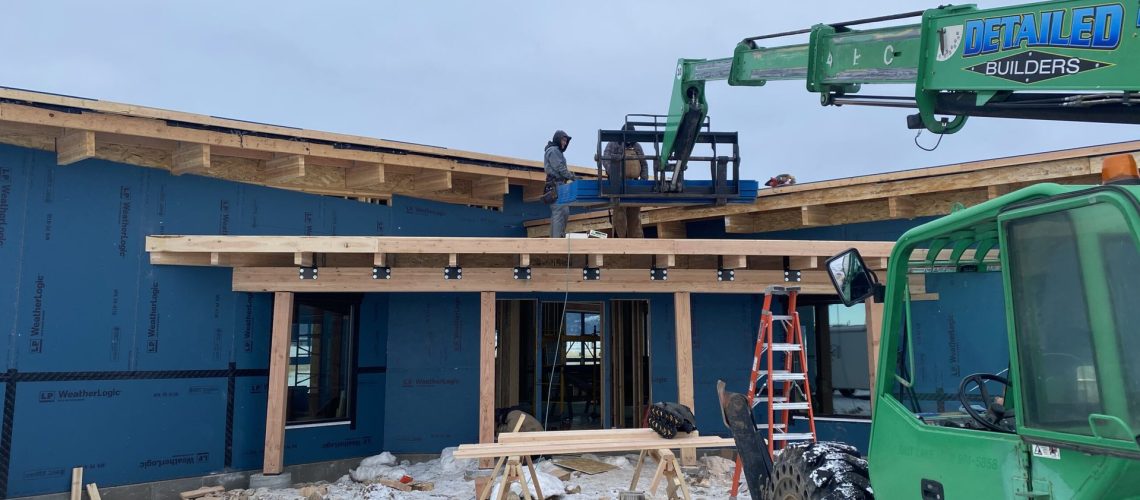For many, the ultimate residential dream is building a custom home. Picture a space meticulously tailored to every aspect of your lifestyle, from the architectural layout to the final touches. Yet, the question remains: is investing in a custom home truly worth it? Let’s explore the advantages of choosing custom builds instead of buying an existing house, taking a close look at all the details, and assessing construction costs, potential savings, and unexpected expenses that might arise.
Creating Your Ideal Living Space
In the pursuit of the perfect dwelling, more and more homeowners are turning to the option of custom homes. This approach allows individuals to break free from the limitations of pre-existing houses and instead craft spaces that truly reflect their personal tastes, lifestyles, and aspirations. Here are the unique advantages of going the route of custom construction and how it can lead to constructing not just a house, but a cherished home.
Unmatched Personalization
At the heart of every custom home project is the ability to personalize every aspect of the house. From the foundational layout to the minutest design details, everything is chosen by the homeowner. This level of customization is impossible to find in pre-built homes where one often has to compromise on layout, room sizes, and design elements. Whether it’s a kitchen with double islands to cater to a keen cook or a home office with built-in libraries for the work-from-home professional, the possibilities are endless. This personal approach ensures that every corner of the home is optimized for your comfort and efficiency.
Future-Proofing Through Smart Design
Building a custom home also provides an opportunity to integrate advanced technologies from the outset. Smart home systems that control lighting, heating, security, and more can be seamlessly incorporated into the building plans, creating a home that is both intelligent and intuitive. Moreover, sustainability can be a cornerstone of design choices, with options for eco-friendly materials and systems like solar panels, energy-efficient appliances, and water-saving fixtures. These features not only contribute to a lower carbon footprint but also ensure significant savings on utility bills over time.
Enhanced Quality And Craftsmanship
When you opt for a custom home, you also choose the caliber of the craftsmanship. Custom home builders often work with higher-quality materials and employ skilled tradespeople who are specialists in their fields. This can lead to a better-constructed home with high-grade materials that can withstand the test of time better than many mass-produced homes. Additionally, working closely with a builder gives homeowners a clear line of sight into the construction process, fostering a level of transparency about where and how their money is being invested.
Emotional Value And Satisfaction
There is an immense emotional value that comes with watching your dream home take shape before your eyes. The journey from conceptualization to the final build can be profoundly satisfying. Knowing that your home is uniquely yours, tailored to fit your life perfectly, creates a deep sense of attachment and pride that is hard to achieve with a purchased existing home.
Financial Investment And Return
While the upfront costs of building a custom home can be higher than buying an existing one, the long-term benefits often justify the initial investment. Custom homes can be a wise financial investment as they are typically constructed with more current and durable materials, demand less maintenance, and have greater appeal should you ever decide to sell. The uniqueness of a custom-built home can also significantly boost its market value, making it an attractive asset.
Key Considerations For Creating Your Dream Custom Home
Building a custom home is a venture full of excitement and potential, offering the rare opportunity to tailor every aspect of your living environment to your personal preferences. However, it’s a project that requires significant planning, decision-making, and attention to detail. Here are essential considerations to keep in mind when embarking on the journey of constructing your custom home, ensuring the process is as smooth and rewarding as possible.
1. Budget Planning And Management
One of the most critical steps in the custom home-building process is setting a realistic budget and sticking to it. Costs can escalate quickly, so it’s important to include not only construction expenses but also the price of the land, permits, design fees, and a buffer for unexpected costs. Consulting with a financial advisor to secure a construction loan that suits your needs and managing cash flow throughout the project are vital steps in maintaining financial control.
2. Choosing The Right Lot
The location of your custom home will significantly influence both its design and its functionality. Consider factors like soil stability, drainage, local climate, and accessibility to utilities when selecting your lot. Also, think about the community’s characteristics, local schools, and amenities, as these can affect your lifestyle and the home’s future resale value.
3. Selecting Competent Home Builders
A custom home project relies heavily on the expertise of the professionals involved. This team typically includes an architect, a custom home builder, possibly an interior designer, and various contractors. Selecting experienced professionals who understand your vision and have a proven track record is crucial. Research their past projects, consult their previous clients, and ensure they hold the necessary licenses and insurance.
4. Design Priorities And Lifestyle Needs
Early in the design process, clearly define what features are most important to you. Consider how your lifestyle needs might evolve over time. For instance, a young family might prioritize playrooms or outdoor spaces, while those nearing retirement might consider accessibility features. Energy efficiency should also be a priority, including options like solar energy, high-efficiency appliances, and sustainable materials.
5. Legal And Zoning Requirements
Before beginning construction, understanding the local building codes and zoning laws is essential. These regulations will affect what you can build, where you can build it, and how utilities should be handled. It’s advisable to have your builder and architect coordinate on obtaining all necessary permits to ensure compliance and prevent legal issues down the line.
6. Project Timeline
Building a custom home generally takes longer than purchasing a pre-existing home. Weather conditions, material availability, labor schedules, and permit approvals can all impact the timeline. Set realistic expectations for completion, and stay flexible and patient. Regular communication with your builder and architect will help keep the project on track and inform you of any delays or issues.
7. Resale Considerations
While a custom home is tailored to your preferences, considering potential resale can influence some design decisions. Extremely personalized or unusual features might not appeal to the general market and could affect the home’s future resale value. Striking a balance between personalization and marketability can ensure that your home remains a viable investment.
Understanding The Costs Of Building A Custom Home

Building your own custom home is a dream for many, offering the unique opportunity to create a space that’s perfectly tailored to your needs and tastes. However, understanding the financial implications is essential before embarking on this significant journey. Let’s take a look at how much building a custom home costs, optimizing crucial factors such as the construction loan, ways to save money, and insights from past clients.
Estimating Construction Costs For Your Dream House
The cost of constructing a custom home can vary widely based on several factors including location, materials, the complexity of the design, and the current market conditions. As a starting point, it’s critical to secure a construction loan. This specialized loan is designed to finance the building process, providing you with the necessary funds to cover both labor and materials. The amount you may need can range significantly, often anywhere from $100 per square foot in more rural areas to $500 per square foot or more in high-demand urban settings.
Land Ownership And Its Impact On Budget
Owning your own land can be a significant advantage when building a custom home. Not only does it allow you more control over the entire construction process, but it can also save money that would otherwise be spent purchasing property. However, it’s important to factor in any additional costs related to preparing the land for construction, such as clearing, excavation, and the potential need for special foundation treatments due to soil conditions.
Custom Build Considerations That Affect Pricing
Every choice in the custom build process can affect the total cost. High-end finishes and custom architectural features, such as vaulted ceilings, bespoke built-ins, and large expanses of glass, can quickly increase the overall expenses. Energy-efficient technologies, while potentially costly upfront, can save money in the long run on utility bills, offering a worthwhile consideration for potential savings.
Insights From Past Clients On Money Spent
Feedback from past clients who have gone through the process of building their own custom home can be invaluable. Many suggest budgeting an extra 10-20% on top of your expected costs to cover unexpected expenses that arise during construction. This extra money spent can ensure that you are prepared for any surprises without compromising on the quality of your dream house.
How To Save Money While Building Your Own Home
There are several strategies to keep costs manageable while creating your custom dream home:
Choosing the Right Builder: Select a custom home builder with a good reputation and transparent pricing who can bring efficiency and expertise to the project.
Simplifying the Design: Opting for a simpler, more compact design can reduce material and labor costs significantly.
Material Selections: You can save money without sacrificing style by choosing cost-effective materials that offer durability and visual appeal.
Phased Building: Consider completing your home in phases, which can spread the financial burden over time and allow for adjustments based on budget constraints
The Value Of Building A Custom Home
Deciding whether to build a custom home boils down to valuing personalization and long-term satisfaction. While the initial costs and the complexity of the project may seem daunting, the result is a home tailored precisely to your lifestyle, preferences, and future needs. It’s more than a house—it’s your retreat crafted to your specifications, offering unmatched comfort and a sense of accomplishment.
At Swager Builds, we understand the significance of each decision in the custom home building process. Our team of experts is dedicated to transforming your vision into reality, ensuring that every aspect of your dream home meets your expectations without compromising on quality or budget. With Swager Builds, you’re not just building a house; you’re crafting your future.
Ready to take the first step towards creating your dream custom home? Contact us today, and let us help you turn your dream into a living reality.


